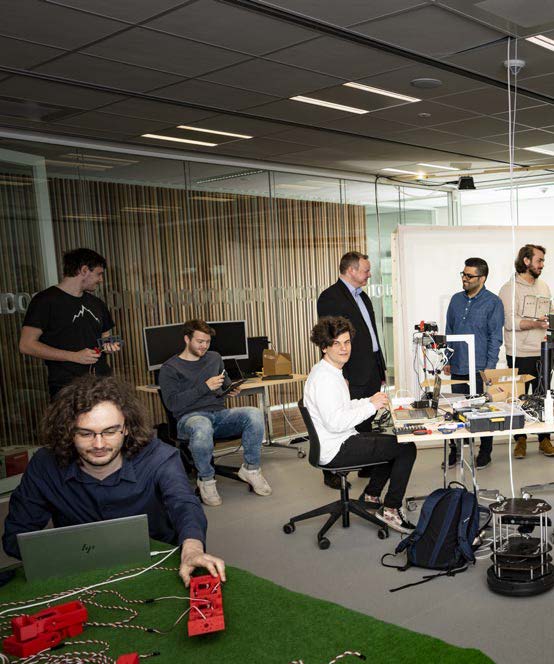Cognitive robotics: intelligence from the network
At Maastricht University, the SwarmLab investigates how to build smart robots and other embodied AI systems from many much simpler components.
Isolate a single neuron in the human brain, look at it under the microscope and attach the most advanced measuring equipment to it. But whatever you try, you will never understand human intelligence by simply studying isolated neurons. Intelligence arises from the cooperation between tens of billions of neurons. ‘Human intelligence can therefore be seen as a kind of swarm intelligence, a swarm consisting of neurons’, says Rico Möckel, associate professor for Cognitive Robotics and Intelligent Systems at Maastricht University.
This idea of swarm intelligence is central to the research conducted by SwarmLab, which is part of the Department of Data Science and Knowledge Engineering (DKE) at Maastricht University. Möckel: ‘I’m interested in distributed intelligence, like in a swarm of neurons or a swarm of birds. And I believe that if you want to build smart robots and other embodied AI systems, which is our goal, then you must do this according to a similar swarm principle by letting the intelligence emerge from components that organise themselves into intelligent structures and societies.’
At SwarmLab, you can see experiments on swarms of drones, but also work on modular robots for use in education and work on smart prosthetics and brain-computer interfaces. ‘We have a broad view on what constitutes a robot’, says Möckel. ‘As far as we’re concerned, a building equipped with sensors and actuators is also a robot.’ Starting from the scientific question of what makes a system intelligent, the researchers at SwarmLab look for human-friendly applications. Möckel: ‘We aim to integrate our research into concrete products that really benefit people.’
To achieve this, SwarmLab works, for example, with the FieldLab Robotics in Roermond, a knowledge centre for companies, educational institutions and authorities in the field of industrial robotisation. SwarmLab is also working with TU Delft, TNO and the Port of Rotterdam on developing swarm intelligence for the port.
The latest project that Möckel and his colleagues are working on is the European CoRoSect project in which cognitive robotics solutions are being developed for automated insect farms. Möckel: ‘The idea is to get rid of the inefficiency and waste in our current food chain by using protein-rich insects. They can provide a lot of food, and that can be done very efficiently if we rear them on a highly automated farm with smart robotics.’
Control by brain
Kirill Tumanov, who is currently a researcher at Maastricht University within the project Combating Child Obesity, did his PhD research from 2015 to 2019 at SwarmLab. As a teenager in Yaroslavl (Russia), he dreamed of controlling machines using brain signals and building brain-computer interfaces. When he was studying for his master’s degree at Maastricht University, he started looking for a PhD project in which he could fulfil his dream. That turned out to be possible at SwarmLab, thanks to a collaboration with the neuroscience team of Bettina Sorger and Rainer Goebel at Maastricht University. ‘I was using functional near-infrared spectroscopy to read brain signals of participants and see whether they could control autonomous assistive robots. The idea is that in the future, people with a severe physical handicap could use this technology to independently interact with their environment.’
When Tumanov started in 2015, the SwarmLab group was in its infancy. He saw the group gradually grow. One of the keys to creating a sense of belonging in the research group was a “journal club”. Tumanov explains: ‘Every member of the lab would choose a scientific article that he or she thought would be of interest for everybody in the group, an article showing what is happening in the field. We would read the paper and discuss it together. This facilitated crossover between the different research directions.’
Feeling in prosthetic arm
PhD student Lucas Dahl is a member of SwarmLab. He is doing research on a prosthetic arm. Wearers of current prosthetic arms cannot feel what they are grasping or touching. Dahl wants to take the next step: ‘We’re investigating how a prosthetic arm can give a feeling to the wearer of that arm. What is unique about our prosthesis is that it has artificial skin, artificial muscles, and artificial intelligence.’
Dahl is still investigating how to distinguish between different types of tactile information entering the prosthetic arm. ‘I have a background in mechatronics. However, I know very little about AI. But that is the beauty of SwarmLab: we have people who are experts in AI, and I can make good use of their knowledge.’
The fact that he can easily supplement his own knowledge with the AI knowledge of other researchers in the SwarmLab was one of the main reasons why Dahl wanted to do his research at Maastricht University. ‘If you want to build cognitive robots that are aware of their surroundings, you have to combine mechatronics with AI.’
Besides a great diversity of scientific specialisms, SwarmLab also has a superb mix of nationalities. Dahl: ‘We have people from the Netherlands, Germany, China, Russia, India, Iran… One of our most enjoyable joint activities before the pandemic was going to the home of one of our colleagues and cooking something from his or her national cuisine.’
Group passport
Research field: swarm robotics, cognitive robotics, smart mechatronics, brain-robot interfaces, data science, human and machine intelligence, machine learning, self-organisation
Institution
- Maastricht University
Employees (as of May 2021)
- 3 professors, 4 associate professors, 3 assistant professors, 6 PhD students
Facility
- SwarmLab for building robots and other embodied AI systems, with the aim to gain a deep understanding of the design and control of biological and artificial intelligent systems.
Websites
- SwarmLab
- Robots in education
- Brain-Robot project
- Automated insect farming
- FieldLab Robotics Roermond
Published in I/O Magazine #2 2021
Text Bennie Mols
Images Ivar Pel
